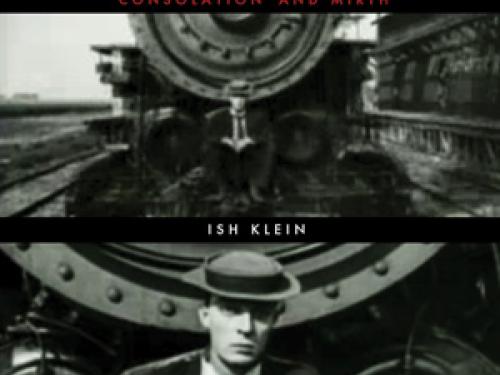
Poetry is a form of code. Deciphering this code can result in a surprising array of emotions: it can reveal information of vital importance; it can relay ideas in an undetectable fashion. It can also go straight to the heart of discomfort. I have been thinking about poetry as code a lot these days. I am thinking about my own relationship with discomfort as well. Ish Klein’s latest collection from Canarium, Consolation and Mirth, fits quite well with these ideas now. It shows us both how to decode a certain language and how to allow for not-knowing; it brings us face-to-face with what it feels like when we can’t decode anything.
In Consolation and Mirth, Kleinpresents us with a world of dis-riddles, puzzles in various forms of decay, distorting the familiar language of instruction manuals and quizzers into the unsolvable; forcing readers into a place of discordant unease where the question is not what are the answers, but why do we so desperately need them.
There are the entanglements of poetic language, explicitly, but so many of these poems seem to be actual cryptographs, full of semaphore and signal. Take for instance “Tactile Alphabet,” where phrases explain both physical instructions, empathetic interjections, and mandative subjunctive, but to an unknown end:
(Y)Add over this “Y” to face the earth, the one “Y” to face
the sky.
(Z)Then 90 degrees clockwise “z” atop the 180 degrees “z”.
Do the instructions make sense? That is hardly the point. Our minds respond to the commands despite the oddity of it all; we humans are problem-solvers and Klein knows this. Yet, deliberately, nothing comes from the steps—this is not an IKEA manual; you will not produce a white particleboard desk at the end.
Still, Consolation and Mirth kept me looking for that proverbial desk—I spent much of my time glancing to the back of the book for an answer key, as I have been trained to do since childhood. There is no key. The feeling inside me, discovering this lack over and over, was strangely similar to the feeling of just, you know, being alive. No, seriously: it’s like those times when you pull your mind out of the task at hand, look at the sky, and think, “What...is all this? What on earth…is going on?” At those times, all of the world seems like a blank, empty, endless question mark; a borderless loneliness.
No place else in the book is this missing key more felt than in the section “Science Fiction Society,” where we are explicitly told, at the beginning, “EACH OF THESE RIDDLES HAS A SOLUTION.” Yet we are not privy to these solutions. Reading each riddle feels, in so many ways, exactly like being conscious, right now, surrounded by not knowing. This not knowing is quite uncomfortable. It is enough to make you want to look away. Yet there is the fierce temptation to continue, to find the solution to a problem with no answer key.
I a word
births me.
Who on earth
am I?
Or what on
earth is
not the word
I am?
Who on earth am I, indeed?
These poems remind me how much we humans love riddles with answers, punch lines, the ends of mystery novels, the full-circle pub quiz. Why? Solvable puzzles are some of the few things on this inexplicable and random earth with answers. “Give us the answers!” we scream, and then we concoct our own flimsy constructs to provide ourselves with them.
Consolation and Mirth turns that idea on its head. It makes us look at the unknowing, inside of us and without; it makes us sit with how uncomfortable the unknowing really is.
